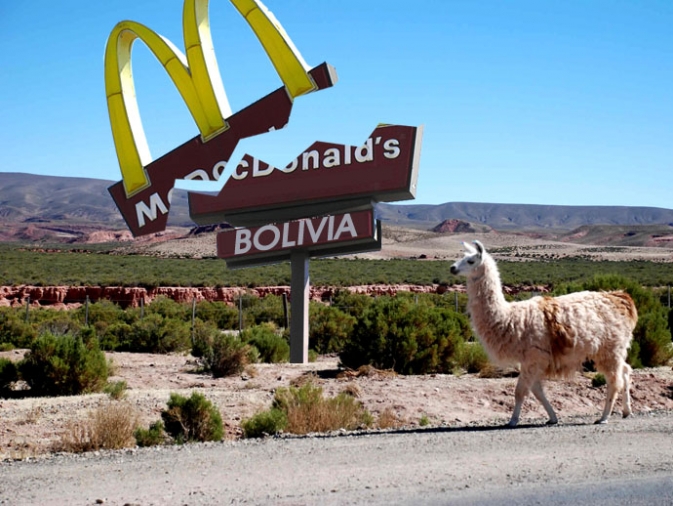Latin America
Related: About this forumBolivia's Fast-Food Rejection Made McDonald's Close Its Restaurants
Bolivia's Fast-Food Rejection Made McDonald's Close Its Restaurants
November 22nd, 2013, 20:40 GMT · By Alexandra Botezatu
 ?1385134484
?1385134484
It seems McDonald's isn't so successful after all, still facing consequences after its first major rejection in Bolivia, and years of enduring losses. Despite its cheap prices and fast service, McDonald's wasn't accepted in Bolivia, being regarded as a filthy, unhealthy advertising scheme.
Bolivia's demographics include indigenous populations with a strong connection to traditions and nature. For them, the fast food ways of cooking and serving meals are distrusting and not worth spending money. In comparison with the US, Bolivians appreciate a home-cooked family dinner than more they do a cheap BigMac or a HappyMeal.
After a decade of actual losses, there were just eight McDonald's restaurants left in the entire country, scattered between the major cities of La Paz, Cochabamba and Santa Cruz de la Sierra, according to Get Holistic Health.
The franchise persisted despite Bolivians’ obvious rejection, but the time came when McDonald's had to close even the last standing location and tell Bolivia “Goodbye.”
More:
http://news.softpedia.com/news/Bolivia-s-Fast-Food-Rejection-Made-McDonald-s-Close-Its-Restaurants-402873.shtml
Zorro
(15,737 posts)Paolo123
(297 posts)but are we sure this isn't just hype:
Bolivia's demographics include indigenous populations with a strong connection to traditions and nature. For them, the fast food ways of cooking and serving meals are distrusting and not worth spending money. In comparison with the US, Bolivians appreciate a home-cooked family dinner than more they do a cheap BigMac or a HappyMeal.
Everywhere in Central and South America I have been (and I have not been to Bolivia) the eating is not particularly healthy and the fast food concept is very common in the form of people deep frying various foods on the street corner.
Judi Lynn
(160,515 posts)Bolivia: A Country With No McDonald’s
What America can learn from one of the most sustainable food nations on Earth.

[font size=1]
A market in La Paz showcases some of the many varieties of food grown in Bolivia. (Photo by: Shannon DeCelle) [/font]
June 05, 2013 By Steve Holt
If you traverse the South American nation of Bolivia, from the heights of the Andes Mountains to the Amazon Jungle to the urban streets of Santa Cruz, you’ll never once find a Big Mac or a McNugget. They don’t exist there—and haven’t for about a decade. McDonald’s couldn’t survive in the mountainous country, so in 2002 the global fast-food chain closed its last store.
This is ancient news in Bolivia, of course, but a 2011 documentary about the oddity sent the story around the world and caused many to ask, “What’s Bolivia doing so right that McDonald’s couldn’t make it there?”
The documentary pointed out that one of the main reasons the Golden Arches went bloated belly-up in Bolivia (the first McDonald’s-free Latin-American country) is because Bolivians preferred their traditional foods and food ways to fast food. But Tanya Kerssen, who leads food sovereignty tours in Bolivia and serves as a Research Coordinator for Food First/the Institute for Food and Development Policy, says Bolivians still love hamburgers—definitely not a traditional food—they just prefer to buy them from the thousands of indigenous women (called cholitas) hawking food on the streets.
“People line up eating hamburgers on the street. It’s sort of like a massive, decentralized McDonald’s, controlled by all these indigenous women, mostly,” Kerssen tells TakePart. “They look on these foreign entities with suspicion—and rightly so. They prefer to purchase from, to have a relationship with, people from their own country or community or family.”
More:
http://www.takepart.com/article/2013/06/05/country-no-mcdonalds